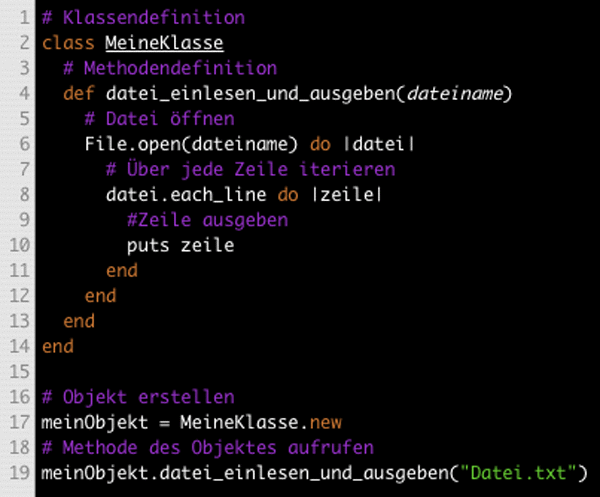Have you ever wondered if you can do something to make your ruby development even faster?
Are you tired of waiting for rspec to finish?
Is your rails application eating more and more memory and you have to restart your app once in a while?
Ok, This is one of those paths to improve your ruby dev life, nothing new, but very effective.
What is REE?
As you can read on the ruby site: "Ruby is a dynamic, open source programming language with a focus on simplicity and productivity. It has an elegant syntax that is natural to read and easy to write…. and it continues". But the most important part, as of this post, is its garbage collection technique: "mark-and-sweep".
Modern requirements has pushed developers to implement and improve current techniques to recycle memory and maximize resources.
Ruby Enterprise Edition has come to attack this matter, replacing the garbage collector algorithm with "copy-on-write", implementing a forking model(reducing application’s memory usage by 33% on average) and the most important part (again, as of this post): the ability to tweak the garbage collector via environment variables.
Based on the documentation and some research made by well known companies (twitter, 37signals), you can gain a lot of performance if you tweak the garbage collector settings used by ruby enterprise edition, I’ll show you my own benchmark tests. Being part of a release engineering team, I need to run all tests as fast as possible, finding this technique highly effective.
Installing REE
I’ll guide you through this post assuming that you already have rvm installed on your computer.
ecruz@ecruz-mbp:project (master)$ rvm install ree
#go and grab a drink, preferably coffee or beer
#some output
#done.
ecruz@ecruz-mbp:project (master)$ rvm use ree
ecruz@ecruz-mbp:project (master)$ rvm list
rvm rubies
=> ree-1.8.7-2010.02 [ x86_64 ]
ruby-1.8.7-p302 [ x86_64 ]
ruby-1.9.1-p378 [ x86_64 ]
ecruz@ecruz-mbp:project (master)$ ruby -v
ruby 1.8.7 (2010-04-19 patchlevel 253) [i686-darwin10.4.0], MBARI 0x6770, Ruby Enterprise Edition 2010.02
ecruz@ecruz-mbp:project (master)$
Done, you are ready to rock using ruby enterprise edition, next step, install gems under ree
ecruz@ecruz-mbp:project (master)$ rvm gemset create my_new_gems
ecruz@ecruz-mbp:project (master)$ bundle install
Installing ...
Installing ....
Using bundler (1.0.3)
Your bundle is complete! It was installed into /Users/ecruz/.rvm/gems/ree-1.8.7-2010.02@my_new_gems
ecruz@ecruz-mbp:project (master)$
Hint: go to this post and make rvm always use your desired gemset@ruby
Ok, perfect… let’s play with our new toy, I’ll run our rspec suite to demonstrate the ree power
ecruz@ecruz-mbp:project (develop)$ time rake spec
=> Building fixtures
..
… in 62.33s
SLOW SPEC: 5.9991 Test A
SLOW SPEC: 5.3510 Test B
SLOW SPEC: 7.8485 Test C
SLOW SPEC: 7.6710 Test D
SLOW SPEC: 5.8465 Test E
SLOW SPEC: 5.9972 Test F
SLOW SPEC: 5.9707 Test G
SLOW SPEC: 5.4557 Test H
SLOW SPEC: 6.0631 Test I
SLOW SPEC: 5.4861 Test J
1763/1763: 100% |##########################################| Time: 00:10:43
Finished in 643.211296 seconds
1763 examples, 0 failure, 1 pending
real 13m45.186s
user 11m0.745s
sys 0m20.082s
Mmhm, that was… ‘fast’, I wonder how previous numbers performed.
ecruz@ecruz-mbp:project (develop)$ rvm use 1.8.7
Using /Users/ecruz/.rvm/gems/ruby-1.8.7-p302
ecruz@ecruz-mbp:project (develop)$ rvm gemset create my_new_gems
ecruz@ecruz-mbp:project (develop)$ rvm gemset use my_new_gems
Now using gemset 'my_new_gems'
ecruz@ecruz-mbp:project (develop)$ bundle install
Installing ...
Installing ....
Using bundler (1.0.3)
Your bundle is complete! It was installed into /Users/ecruz/.rvm/gems/ruby-1.8.7-p302@my_new_gems
ecruz@ecruz-mbp:project (develop)$ time rake spec
=> Building fixtures
...
in 84.92s
SLOW SPEC: 8.6082 Test A
SLOW SPEC: 10.3736 Test B
SLOW SPEC: 11.3856 Test C
SLOW SPEC: 7.4864 Test D
SLOW SPEC: 6.5998 Test E
SLOW SPEC: 8.8307 Test F
SLOW SPEC: 8.8013 Test G
SLOW SPEC: 8.8126 Test H
SLOW SPEC: 8.9622 Test I
SLOW SPEC: 8.9033 Test J
1763/1763: 100% |##########################################| Time: 00:15:30
Finished in 930.143889 seconds
1763 examples, 0 failure, 1 pending
real 19m40.629s
user 16m13.691s
sys 0m21.632s
Wow! I hadn’t noticed the huge difference between ruby 1.8.7 and ruby enterprise edition, that was ~1.4x faster!
Ok, I got huge difference between two versions, the question is, can it be improved? The answer is found in REE documentation, section Garbage Collector Performance Tunning. Twitter has published their production settings, let’s see what we can get.
ecruz@ecruz-mbp:project (develop)$ rvm use ree
Using /Users/ecruz/.rvm/gems/ree-1.8.7-2010.02
ecruz@ecruz-mbp:project (develop)$ rvm gemset use my_new_gems
Now using gemset 'my_new_gems'
ecruz@ecruz-mbp:project (develop)$ time RUBY_HEAP_MIN_SLOTS=500000 RUBY_HEAP_SLOTS_INCREMENT=250000 RUBY_HEAP_SLOTS_GROWTH_FACTOR=1 RUBY_GC_MALLOC_LIMIT=50000000 rake spec
=> Building fixtures
..
...in 44.06s
SLOW SPEC: 6.2397 Test C
SLOW SPEC: 8.4131 Test D
SLOW SPEC: 5.6498 Test E
1763/1763: 100% |##########################################| Time: 00:06:53
Finished in 413.352603 seconds
1763 examples, 0 failure, 1 pending
real 9m26.457s
user 6m46.696s
sys 0m20.475s
You should’ve seen my face when I came back and saw the results, that meant 2.2x faster!
My next thought was: I have to make this a permanent change in my system, so it was easy:
ecruz@ecruz-mbp:project (develop)$ echo "RUBYHEAPMINSLOTS=500000" >> ~/.bashprofile
ecruz@ecruz-mbp:project (develop)$ echo "RUBYHEAPSLOTSINCREMENT=250000" >> ~/.bashprofile
ecruz@ecruz-mbp:project (develop)$ echo "RUBYHEAPSLOTSGROWTHFACTOR=1" >> ~/.bashprofile
ecruz@ecruz-mbp:project (develop)$ echo "RUBYGCMALLOCLIMIT=50000000" >> ~/.bash_profile
After I put new configs to always apply, I decided to benchmark the app, via web, and I found this:
Using Standard Ruby 1.8.7
ecruz@ecruz-mbp:project (develop)$ ab -n 1000 -c 100 http://127.0.0.1:8080/store/Category/1/1/100/new
This is ApacheBench, Version 2.3 <$Revision: 655654 $>
Copyright 1996 Adam Twiss, Zeus Technology Ltd, http://www.zeustech.net/
Licensed to The Apache Software Foundation, http://www.apache.org/
Benchmarking 127.0.0.1 (be patient)
Server Software:
Server Hostname: 127.0.0.1
Server Port: 8080
Document Path: /store/Category/1/1/100/new
Document Length: 97015 bytes
Concurrency Level: 100
Time taken for tests: 56.476 seconds
Complete requests: 1000
Failed requests: 0
Write errors: 0
Total transferred: 97360264 bytes
HTML transferred: 97015000 bytes
Requests per second: 17.71 [#/sec] (mean)
Time per request: 5647.631 [ms] (mean)
Time per request: 56.476 [ms] (mean, across all concurrent requests)
Transfer rate: 1683.51 [Kbytes/sec] received
Connection Times (ms)
min mean[+/-sd] median max
Connect: 0 0 0.8 0 6
Processing: 89 5378 899.5 5653 6163
Waiting: 88 5377 899.5 5652 6162
Total: 92 5378 898.9 5653 6165
Ruby Enterprise Edition
ecruz@ecruz-mbp:project (develop)$ ab -n 1000 -c 100 http://127.0.0.1:8080/store/Category/1/1/100/new
This is ApacheBench, Version 2.3 <$Revision: 655654 $>
Copyright 1996 Adam Twiss, Zeus Technology Ltd, http://www.zeustech.net/
Licensed to The Apache Software Foundation, http://www.apache.org/
Benchmarking 127.0.0.1 (be patient)
Server Software:
Server Hostname: 127.0.0.1
Server Port: 8080
Document Path: /store/Category/1/1/100/new
Document Length: 97015 bytes
Concurrency Level: 100
Time taken for tests: 45.212 seconds
Complete requests: 1000
Failed requests: 0
Write errors: 0
Total transferred: 97360134 bytes
HTML transferred: 97015000 bytes
Requests per second: 22.12 [#/sec] (mean)
Time per request: 4521.241 [ms] (mean)
Time per request: 45.212 [ms] (mean, across all concurrent requests)
Transfer rate: 2102.92 [Kbytes/sec] received
Connection Times (ms)
min mean[+/-sd] median max
Connect: 0 1 1.0 0 5
Processing: 83 4285 706.4 4456 5027
Waiting: 82 4284 706.4 4455 5026
Total: 88 4286 705.5 4456 5028
Ruby Enterprise Edition with twitter settings
ecruz@ecruz-mbp:project (develop)$ ab -n 1000 -c 100 http://127.0.0.1:8080/store/Category/1/1/100/new
This is ApacheBench, Version 2.3 <$Revision: 655654 $>
Copyright 1996 Adam Twiss, Zeus Technology Ltd, http://www.zeustech.net/
Licensed to The Apache Software Foundation, http://www.apache.org/
Benchmarking 127.0.0.1 (be patient)
Server Software:
Server Hostname: 127.0.0.1
Server Port: 8080
Document Path: /store/Category/1/1/100/new
Document Length: 97015 bytes
Concurrency Level: 100
Time taken for tests: 31.348 seconds
Complete requests: 1000
Failed requests: 0
Write errors: 0
Total transferred: 97360048 bytes
HTML transferred: 97015000 bytes
Requests per second: 31.90 [#/sec] (mean)
Time per request: 3134.784 [ms] (mean)
Time per request: 31.348 [ms] (mean, across all concurrent requests)
Transfer rate: 3033.01 [Kbytes/sec] received
Connection Times (ms)
min mean[+/-sd] median max
Connect: 0 0 0.9 0 5
Processing: 210 2962 562.4 3074 3873
Waiting: 210 2961 562.4 3073 3872
Total: 215 2963 561.6 3074 3873
Ruby Enterprise Edition with 37signals settings
37signals has published their production settings too, and I tried to apply them in my project and I got:
ecruz@ecruz-mbp:project (develop)$ ab -n 1000 -c 100 http://127.0.0.1:8080/store/Category/1/1/100/new
This is ApacheBench, Version 2.3 <$Revision: 655654 $>
Copyright 1996 Adam Twiss, Zeus Technology Ltd, http://www.zeustech.net/
Licensed to The Apache Software Foundation, http://www.apache.org/
Benchmarking 127.0.0.1 (be patient)
Server Software:
Server Hostname: 127.0.0.1
Server Port: 8080
Document Path: /store/Category/1/1/100/new
Document Length: 97015 bytes
Concurrency Level: 100
Time taken for tests: 46.230 seconds
Complete requests: 1000
Failed requests: 0
Write errors: 0
Total transferred: 97360135 bytes
HTML transferred: 97015000 bytes
Requests per second: 21.63 [#/sec] (mean)
Time per request: 4622.981 [ms] (mean)
Time per request: 46.230 [ms] (mean, across all concurrent requests)
Transfer rate: 2056.64 [Kbytes/sec] received
Connection Times (ms)
min mean[+/-sd] median max
Connect: 0 0 0.9 0 5
Processing: 79 4390 760.8 4473 5830
Waiting: 78 4390 760.8 4472 5829
Total: 84 4391 760.0 4473 5830
For all my tests, I used unicorn with 3 workers running in production mode and Memcached enabled. Another huge difference is memory usage, I’ve seen flat, much less memory utilization and response time has been responding ~1.8x faster. You should definitively consider using this approach in your production environments.
*Disclaimer, this is not an extensive research about REE and it’s features, it’s just intended to show small tweaks that can make a huge difference in your daily development work.





